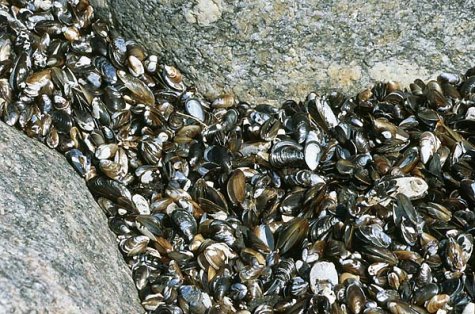Piles of mussel shells can be found on the seashore
Photo: Arne Ader
Translation:SilverT
Mussel shells on the shore of Tahkuna
Bay mussel; foolish mussel Söödav rannakarp Mytilus trossulus
So, about the dinner table of the common eider – the bay mussel has an oblong shape and the front becomes steeply narrower. The colour of the shell is bluish black and it is two-three centimeters in length. Bay mussels sometimes live in relatively large colonies and they attach to solid surfaces using a byssus and while standing still they feed by filtering plankton in the water. It lives in the Baltic Sea in waters which are up to forty meters deep, is relatively numerous, well-endures relatively big changes in salinity and temperature. One square meter of seabed which is populated by bay mussels purifies about 50-280 cubic meters of water a day – quite a significant amount considering the fact that we are living on the coast of the most polluted sea in the world.
Bottom-feeding fish use bay mussels as food: flounder and turbot, but also whitefish.
Many of us have bought cans of bay mussels from the store, produced, for example, in Denmark. The salinity of seawater is greater there and the mussels have a „commercial size“.









